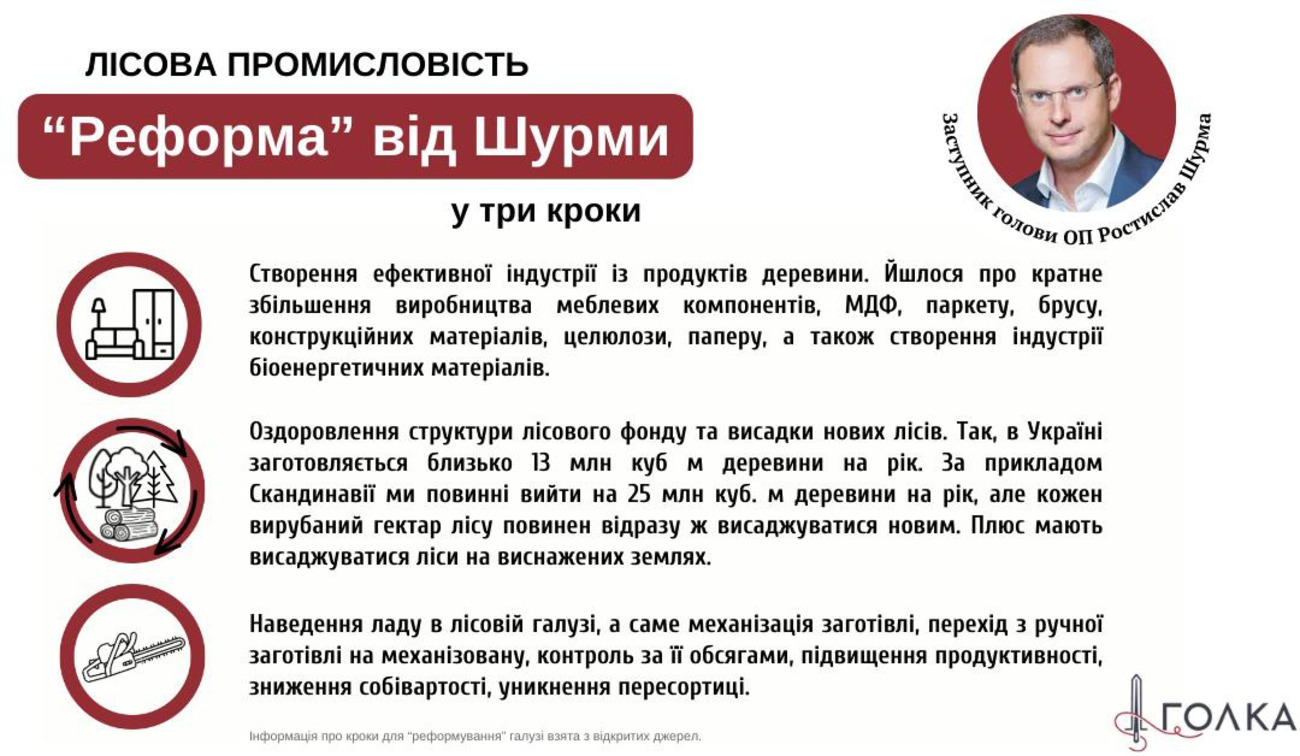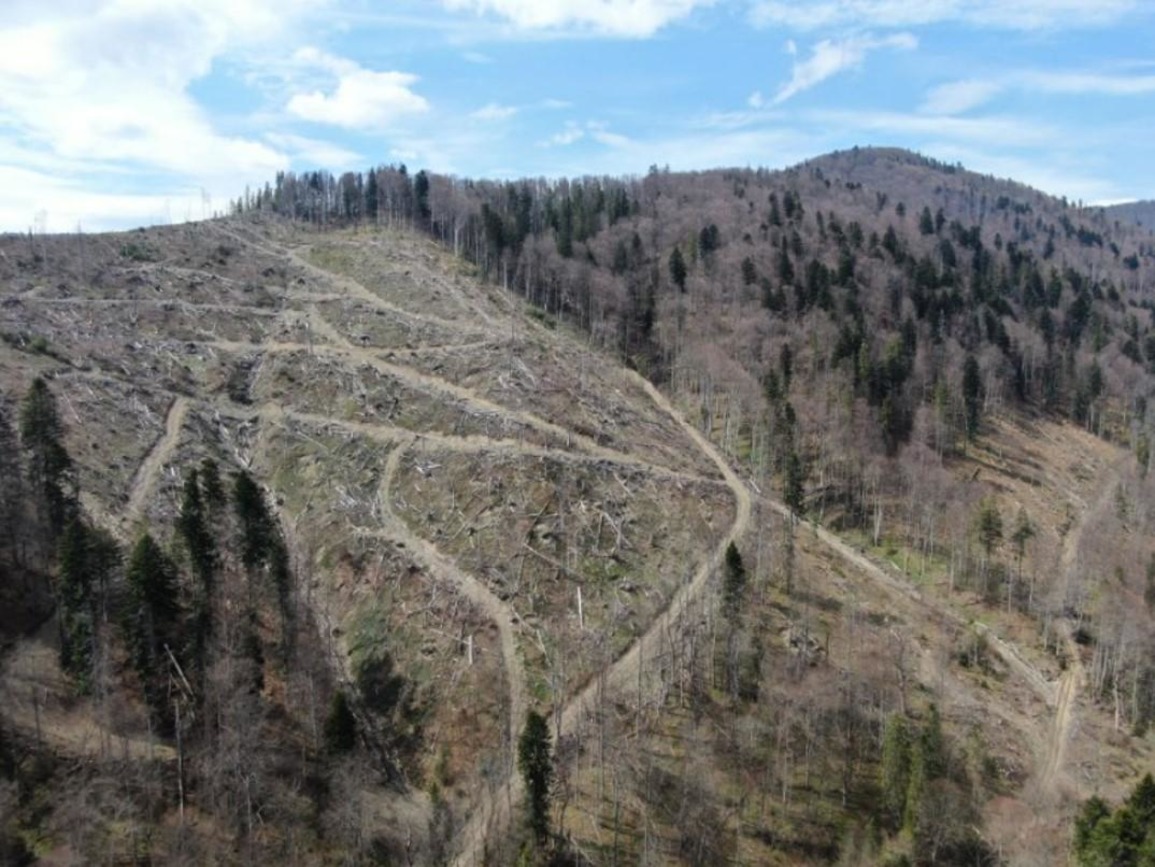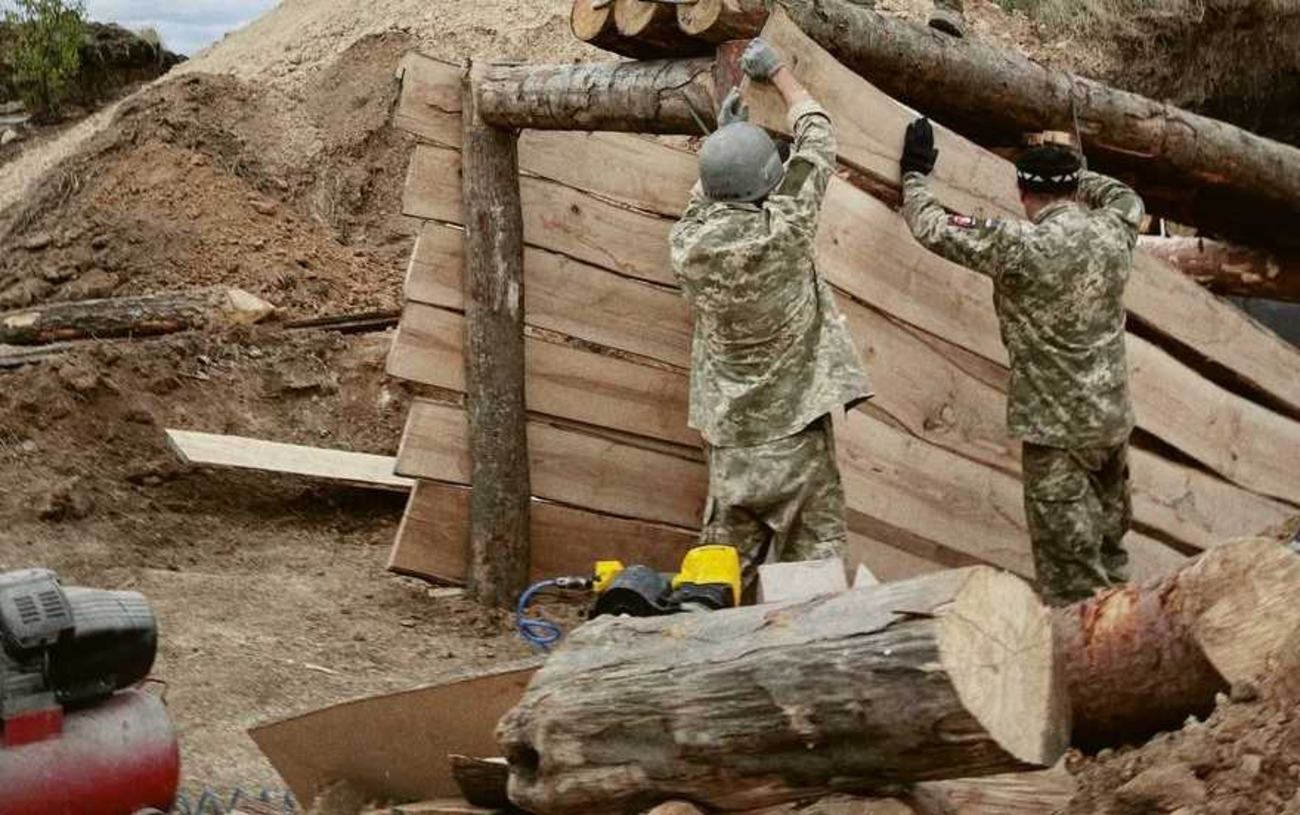В Раде готовят законопроект, развязывающий руки недобросовестным лесорубам?
Рубки в Карпатах и других лесах могут достичь небывалых масштабов. Профильный комитет Верховной Рады одобрил законопроект, который отменяет оценку воздействия на окружающую среду во время санитарных рубок. Если парламент проголосует за это, липкорукие лесоводы смогут выдавать промышленный лес за дрова, и маржу в 2400% класть в свой карман. И, конечно, значительные долгосрочные потери понесет природа.
Законопроект №9516 — инициатива нардепа Александра Матусевича («Слуга народа»), которая очень нужна для деятельности государственного предприятия «Леса Украины». И здесь не обошлось без заместителя главы Офиса президента Ростислава Шурмы, о чем уже писал «Главком».
Украина, в отличие от Европы, не имеет другой системы контроля санитарных рубок, чем оценка воздействия на окружающую среду, и сейчас этот единственный механизм пытаются разрушить.
Как промышленный лес превратить в дрова
Оценку воздействия на окружающую среду обычно рассматривают в контексте экологии. Но в ситуации с санитарной рубкой лесов ее роль как антикоррупционного механизма ничуть не меньше, чем экологическая.
Автор законопроекта Александр Матусевич до избрания нардепом работал директором ГП «Выгодское лесное хозяйство», что на Прикарпатье. И именно лесоводы одни из тех, кто заинтересован в том, чтобы рубки как можно меньше контролировали.
Матусевич со знанием дела обосновывает необходимость отмены оценки воздействия вырубки на окружающую среду. Мол, пока экологи готовят свое заключение, «пропадает древесина, которую можно использовать». «Через шесть месяцев это будут дрова. Местные бюджеты могут недополучать деньги. Деловая древесина стоит дороже в 25 раз, чем дрова. Потери очевидны», — объясняет „слуга народа“.
Вот эта озвученная Матусевичем разница в 25 раз в цене между качественной древесиной и дровами и создает огромные коррупционные риски. Листья прячут в лесу, а товарную древесину — в дровах после санитарных рубок.
Отсутствие оценки воздействия на окружающую среду позволит на бумаге превратить здоровый лес в больной, а значит, государство получит деньги как за дрова, а кто-то продаст древесину в 25 раз дороже. Коррупционная схема, пространство для которой откроет «законопроект Матусевича», если за него проголосует Рада, дает мгновенную рентабельность 2400%.
Самый простой способ построить такую схему по хищению государственного леса в промышленных масштабах — это сплошные санитарные рубки, за что законодателям и предлагают проголосовать.
Замести следы в лесу несложно: после вырубки — только пеньки, по которым невозможно определить, действительно ли дерево было больным. И, очевидно, в лесхозах всегда найдутся желающие заработать на таких схемах.
Коррупционная схема, пространство для которой откроет «законопроект Матусевича», если его проголосует Рада, дает мгновенную рентабельность 2400%
Заместитель председателя Офиса президента Ростислав Шурма еще в прошлом году озвучил тезисы «реформирования» отрасли, среди которых — увеличить заготовки древесины, механизировать заготовки и произвести больше продукции из древесины. Озвученные Шурмой плановые показатели заготовки в 25 млн кубометров древесины в год уже записаны в план Ukraine Facility на 2024-2027 годы, который обнародовало Министерство экономики.

Олег Бондаренко, председатель парламентского Комитета по вопросам экологической политики, который поддержал законопроект и будет предлагать его к рассмотрению в сессионном зале, убеждает, что из текста убрали нормы, которые вызвали сомнения нардепов и общественности.
«Мы оставили только нормы, которые должны ответить на вопрос, что делать с огромными массивами лесов, пострадавших от пожаров и ветровалов. Поэтому ко второму чтению эти дискуссионные нормы могут быть конструктивно и прозрачно доработаны во избежание коррупционных рисков», — уверяет Бондаренко.
Экологи же считают, что любые коррективы не ликвидируют рисков, скрытых в законопроекте.
Руководитель экспертного отдела ОО «Украинская природоохранная группа» Петр Тестов называет манипулятивными аргументы лесоводов, которые говорят, якобы процедура оценки воздействия на окружающую среду мешает бороться с вредителями.
«На сайте „Леса Украины“ есть план рубок на этот год. В Карпатах, например, в Выгодском филиале, санитарные рубки есть и на август, и на сентябрь. Если там лес действительно больной и его надо рубить, то ждать до осени бессмысленно даже с точки зрения классического лесоводства. Ответ прост: в Карпатах сплошные санитарные рубки давно уже являются не чем иным, как способом заготавливать древесину там, где законом запрещены плановые рубки».

«Узаконенный» экоцид
Против «проекта Матусевича» выступает также организация «Экология-Право-Человек». Геоботаник-лесовед Сергей Панченко отмечает, что природоохранники неоднократно фиксировали, как во время сплошных санитарных рубок уничтожают ценные леса.
«На Сумщине в заказнике „Шалыгинский“ представлены старовозрастные светлые дубравы. Их особенность в том, что на бедных почвах дубы раскидистые, дуплистые и, согласно своему возрасту, имеют сухие ветви. Такие леса — приют для редких растений, животных, грибов. Хоть исторические фильмы снимай! Светлые дубравы почти полностью истреблены, но могли бы быть образцом для самих лесоводов. Зато дубраву в Шалыгинском заказнике вырубили именно путем сплошных санитарных рубок, а на ее месте создали плантации сосны, и мы уже не увидим естественного по породному составу леса», — возмущается эколог.
По мнению Панченко, обязательная процедура оценки влияния вырубок на окружающую среду — это путь сохранить подобные леса.
Бесконтрольное уничтожение лесов, если его еще и узаконить, грозит долгосрочными бедами для мира вокруг нас. Так, вырубка может негативно сказаться на способности леса удерживать воду, отмечает преподаватель Киево-Могилянской академии Михаил Хорев.
«Горные леса играют преимущественно водоохранную, почвозащитную и климаторегулирующую роль, выполняют также оздоровительные функции. Сплошные рубки имеют значительное влияние на лишение леса способности удерживать воду. Процедура оценки воздействия на окружающую среду — это именно тот механизм, который позволяет оценить последствия рубки. Есть даже специальные методические рекомендации по исследованию рубок на водосборы, как раз в рамках процедуры оценки воздействия на окружающую среду. Поэтому принимать этот проект и отменять оценку воздействия на окружающую среду для большинства сплошных рубок в Карпатах — бессмысленно», — резюмирует ученый.
Сейчас в стране действует закон «Об оценке воздействия на окружающую среду», которым предусмотрено проведение такой оценки при сплошных санитарных рубках на площади более одного гектара. В большинстве европейских стран такая оценка при санитарных рубках или вообще не предусмотрена, или только для работ на значительно больших площадях — более 5 или 10 га.
Оценка воздействия на окружающую среду — достаточно сложная процедура, и в большинстве случаев ее проведение имеет вид забивания гвоздей микроскопом. Поэтому достаточно резонным представляется вопрос: почему не отказаться от этой процедуры в Украине, если в ЕС без нее обходятся?
Ответ прост: на Западе существует отработанная десятилетиями эффективная система контроля, благодаря которой серьезные исследования нужны лишь в единичных случаях. В Украине же другой системы контроля, кроме оценки воздействия на окружающую среду, нет.
Действительно ли экологические требования мешают лесозаготовкам
До 2017 года санитарные рубки, согласно действующему на то время законодательству, даже не относились к работам, представляющим повышенную экологическую опасность, поэтому не подлежали экологической экспертизе. И это стимулировало коррупцию, катастрофический размах фиктивных санитарных рубок здорового леса и привело к «облысению» Карпат и ряду других сопутствующих негативных последствий для окружающей среды.
Чтобы исправить ситуацию, государство выбрало путь существенного повышения экологических требований и обязательного проведения оценки воздействия на окружающую среду для крупных рубок леса.
Можно спорить, насколько целесообразным и обоснованным был выбранный семь лет назад путь решения проблемы, но неизменным останется факт: за эти годы так и не был создан другой механизм, который мог бы заменить действующие требования проведения оценки воздействия на окружающую среду, обеспечив при этом не худшую экологическую и антикоррупционную защиту.
Действительно, оценка длится не один день, и задержка начала санитарных рубок, конечно, вызывает определенные убытки, потому что состояние древесины за это время ухудшается. Но если убрать эту природоохранную норму, исчезнет прозрачность всего процесса, и одни только убытки от коррупционных схем на вырубке здорового леса под видом больного значительно превысят любые возможные выгоды.
Уместно напомнить, что в июле 2023 года Верховная Рада приняла закон, который позволяет, как заявляют в Министерстве защиты окружающей среды и природных ресурсов, сократить сроки проведения экологической оценки с 216 до 67 дней. Это фактически втрое уменьшает возможные негативные последствия от ухудшения состояния леса до начала рубок, которым лоббисты обосновывают необходимость принятия «законопроекта Матусевича».
Экологический контроль за рубкой леса будет минимизирован, если Рада примет «законопроект Матусевича»
Руководитель специализированной экологической прокуратуры Борис Индиченко свидетельствует: во время досудебных расследований были выявлены отдельные факты незаконной порубки леса под видом санитарных рубок.
«Предложенное проектом закона увеличение площади санитарных рубок без проведения оценки воздействия на окружающую среду до 10 га может только ухудшить состояние законности в этой сфере», — уверен прокурор.
Кроме того, отмечает Индиченко, проект предусматривает изменения в законодательство, которые лишат Минприроды полномочий утверждать нормативы использования лесных ресурсов и согласовывать материалы лесоустройства. При этом любой другой орган такими полномочиями не наделяют, а значит, контроль за такими рубками будет ослаблен, считает прокурор.
Почему военное положение не аргумент?
Лоббисты законопроекта аргументируют его необходимость, в частности, и тем, что процедура экологической оценки не дает возможности вовремя обеспечить фронт древесиной. Природозащитники легко опровергают этот аргумент.
«В Prozorro есть тендеры воинских частей на закупку древесины для фронта. Там доступна информация об объеме и диаметрах нужной древесины, поэтому мы видим, что эти потребности можно спокойно обеспечить плановыми рубками в искусственных сосновых лесах на Полесье прямо сейчас, без всяких изменений в законодательство. Что лесники, в принципе, и делают», — отмечает Петр Тестов из „Украинской природоохранной группы“. И добавляет, что в конкурсе на поставку дерева на передовую победила частная фирма, а не ГП «Леса Украины».

Учтем еще один факт, который нивелирует необходимость законодательных новаций: по официальным данным, сплошные рубки дают где-то 11% добычи древесины. То есть предложенная законопроектом почти полная отмена оценки воздействия на окружающую среду в лучшем случае даст выигрыш в считанные проценты от общего объема добычи леса, что является несущественным, учитывая описанные выше риски.
В тендере на поставку дерева на передовую победила частная фирма, а не ГП «Леса Украины».
Если рассматривать ситуацию через призму вопроса древесины для армии, то стоит обратить взгляд на принятый в 2022 году закон, по которому оценке воздействия на окружающую среду не подлежит деятельность, направленная исключительно на обеспечение обороны государства, ликвидацию последствий чрезвычайных ситуаций, восстановительные работы по ликвидации последствий вооруженной агрессии РФ против Украины во время действия военного положения. То есть уже установлена возможность проводить любую заготовку леса, необходимого для защитников страны, без затрат времени на проведение оценки влияния на окружающую среду.
Народный депутат Юлия Овчинникова из фракции «Слуга народа», которая входит в экологический комитет, отмечает, что в проекте 9516 заложены значительные риски не только для Карпат, но и для евроинтеграции Украины.
«В следующем году в ЕС вступает в силу новый регламент по борьбе с обезлесением (EUDR), который направлен на недопущение попадания на европейский рынок древесины, срубленной незаконным или неустойчивым способом, — напоминает Овчинникова, — Процедура оценки воздействия на окружающую среду является тем предохранителем, который позволяет хоть как-то контролировать сплошные санитарные рубки».
Это еще один аргумент для парламентариев. Но осилит ли он крепкое лобби недобрых «лесных духов»…


